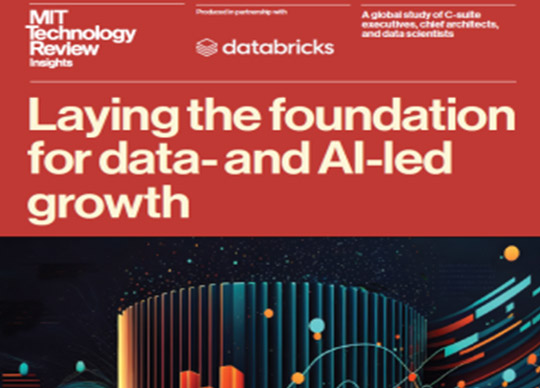
Four in five Australian businesses (80%) expect to become at least 25% more efficient in the next two years thanks to AI technology, a new report from MIT Technology Review Insights has found.
The report, Laying the foundation for data- and AI-led growth, was produced in partnership with Databricks and is based on in-depth interviews with C-Level technology leaders from large public and private sector organisations in Australia and other major markets around the world.
Among the global organisations represented are ADP, Condé Nast, Dell Technologies, General Motors, and Starbucks,
“Australian business – across industry verticals – recognise the potential AI holds in reducing costs, accelerating productivity and innovation, and enabling businesses to be more agile, “said Adam Beavis, Vice President and Country Manager ANZ at Databricks. “While understandably data privacy and governance are top concerns, it’s imperative that organisations build sustainable systems which democratise access to AI and data capabilities across the organisation. Only then can organisations truly realise the potential of their unique data.”
“Early returns are showing almost a two-speed adoption of AI tools across Australian enterprise. On the one hand, some Australian organisations, like the big banks, are moving very fast on AI and using it to build competitive advantage. But on the other hand, we also see that 42% of organisations are moving somewhere between moderate and very slow. The reality for these organisations is that they risk losing competitiveness in the local market, but also compared to their global counterparts,” added Beavis.
Key local findings uncovered by the report:
- Key Australian industries adopting AI at a rapid pace. Australia had proportionately more tech execs (30%) stating that their industry is rapidly adopting AI than any other market. However, 42% stated that their industry has a moderate to slow pace of AI adoption, which highlights that there are a select few industries that are moving at a faster rate of AI adoption than the majority of sectors.
- Leveraging AI for cost-reduction is the top priority. 70% of Australian respondents consider cost-cutting a top priority for AI systems. This contrasts with tech execs in markets like the US, UK, and Singapore, whose main priority for AI projects is to generate new revenue. Moreover, 42% of Australian respondents ranked investment in talent and the workforce the most important factor in their data strategy which would enable them to achieve their goals.
- Lakehouse has become the data architecture of choice for the era of generative AI. Australian enterprises have the second-highest adoption rate (78%) of the lakehouse architecture, behind only those in Japan (80%). Local survey respondents cite a need for data architecture to support streaming data workloads for real-time analytics (a capability deemed “very important” by 78%), easy integration of emerging technologies (60%), and sharing of live data across platforms (50%).
- Democratisation of AI raises the stakes for governance. As business units clamour to use generative AI, executives seek governance frameworks that can provide data accuracy and integrity as well as data privacy and security. 60% of global respondents say a single governance model for data and AI is “very important”, a view shared by 54% of Australian respondents.
- As generative AI spreads, flexible approaches are favoured. 98% of Australian enterprises are using generative AI in some way, with 30% adopting it, and another 68% experimenting with it. The majority (52%) are taking a hybrid approach to developing these capabilities, using vendors’ large language models (LLMs) for some use cases and building their own models when IP ownership, privacy, security, and accuracy requirements are tighter.
- Talent and skills gaps overshadow organisations’ other data and AI challenges. When asked how their company’s data strategy needs to improve, the largest share of Australian respondents (42%) say investing in talent and upskilling the workforce. Four in five (80%) say it will be “very important” to encourage innovation that will help attract and retain talent.
“With data and AI at the forefront of innovation, our report underscores the commitment of C-suite executives to steer toward a transformative future,” says Laurel Ruma, global director of custom content for MIT Technology Review. “Strategic investments, consolidation efforts, and dedication to governance and democratisation of AI are not merely choices; they are imperatives for success.”
You can read the full report here.






